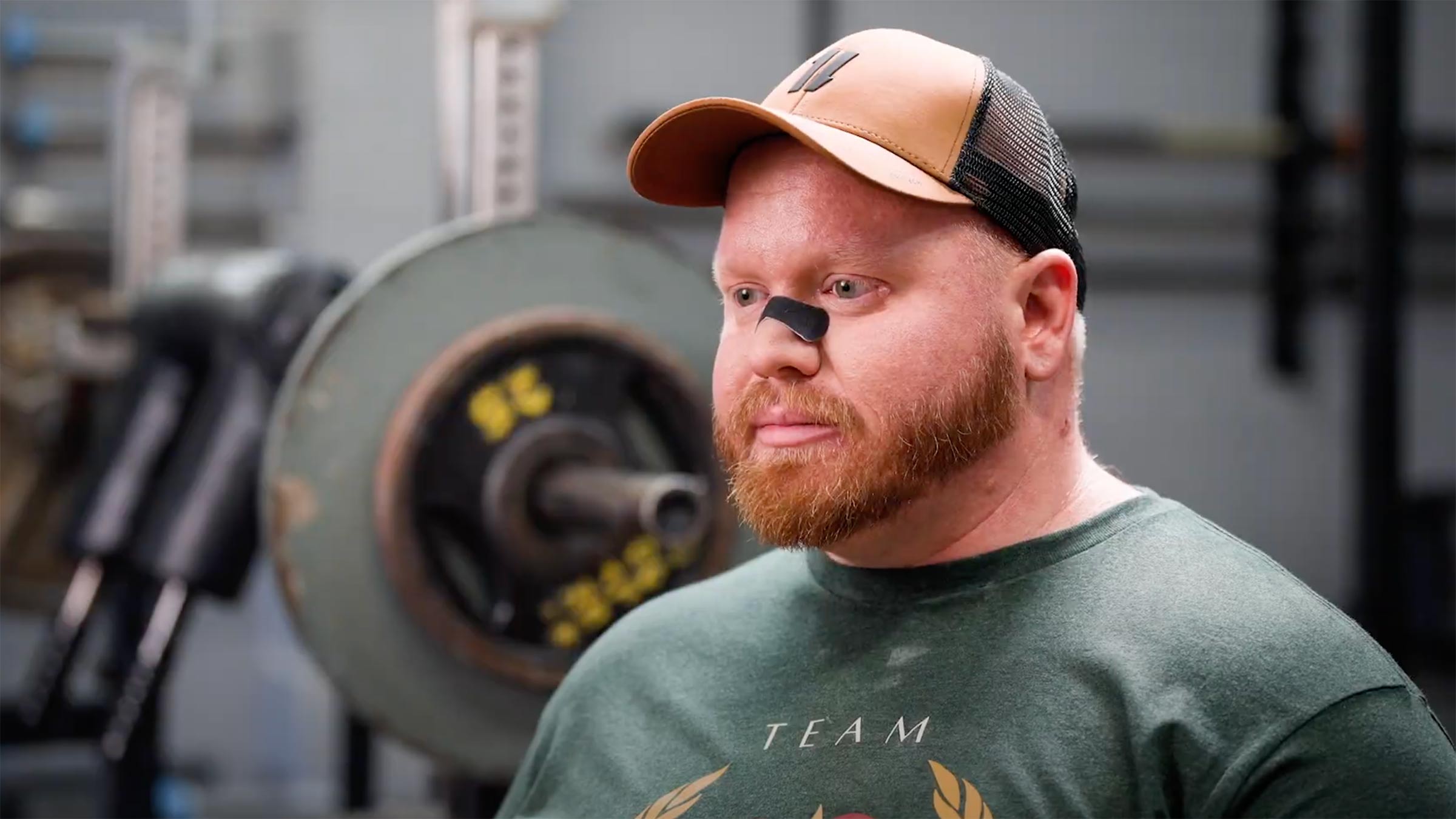Bringing a holistic approach to hernia repair and abdominal wall surgery
Surgeon Benjamin Poulose, MD, MPH, establishes world’s first Center for Abdominal Core Health.
Powerlifting had saved Matthew Hill.
So when he felt a “pop, pop, pop” in his stomach after a 500-pound deadlift, he told himself it was just in his head.
But Hill knew better.
Those pops happened where doctors had placed a piece of mesh after an infection nearly killed him nine years earlier.
Within two days, he was in the emergency department.
After several days in the hospital, Hill left knowing he needed surgery and filled with dread.
Would he ever powerlift again?
Hill turned to surgeon and hernia specialist Benjamin Poulose, MD, MPH, co-director of the world’s first Center for Abdominal Core Health at The Ohio State University Wexner Medical Center.
As part of his mission to shed light on the crucial nature of the body’s core to overall health, Dr. Poulose stresses that there’s no such thing as “just a hernia.” And that couldn’t be truer for Hill.
Finding a calling after a life-and-death situation
Then 28, Hill’s powerlifting wasn’t a mere pastime. It had become a lifeline.
The sport had helped Hill out of darkness and alcohol use that stemmed from treatment for childhood cancer.
Hill clearly recalls when he lost his leg as a teenager to a rare form of bone cancer. But he’s lost the time he spent on a heart-lung bypass machine, the time his parents were told to prepare for his death as he battled an infection. He maintains focus of the months that followed, when he fought to learn to stand and walk again.
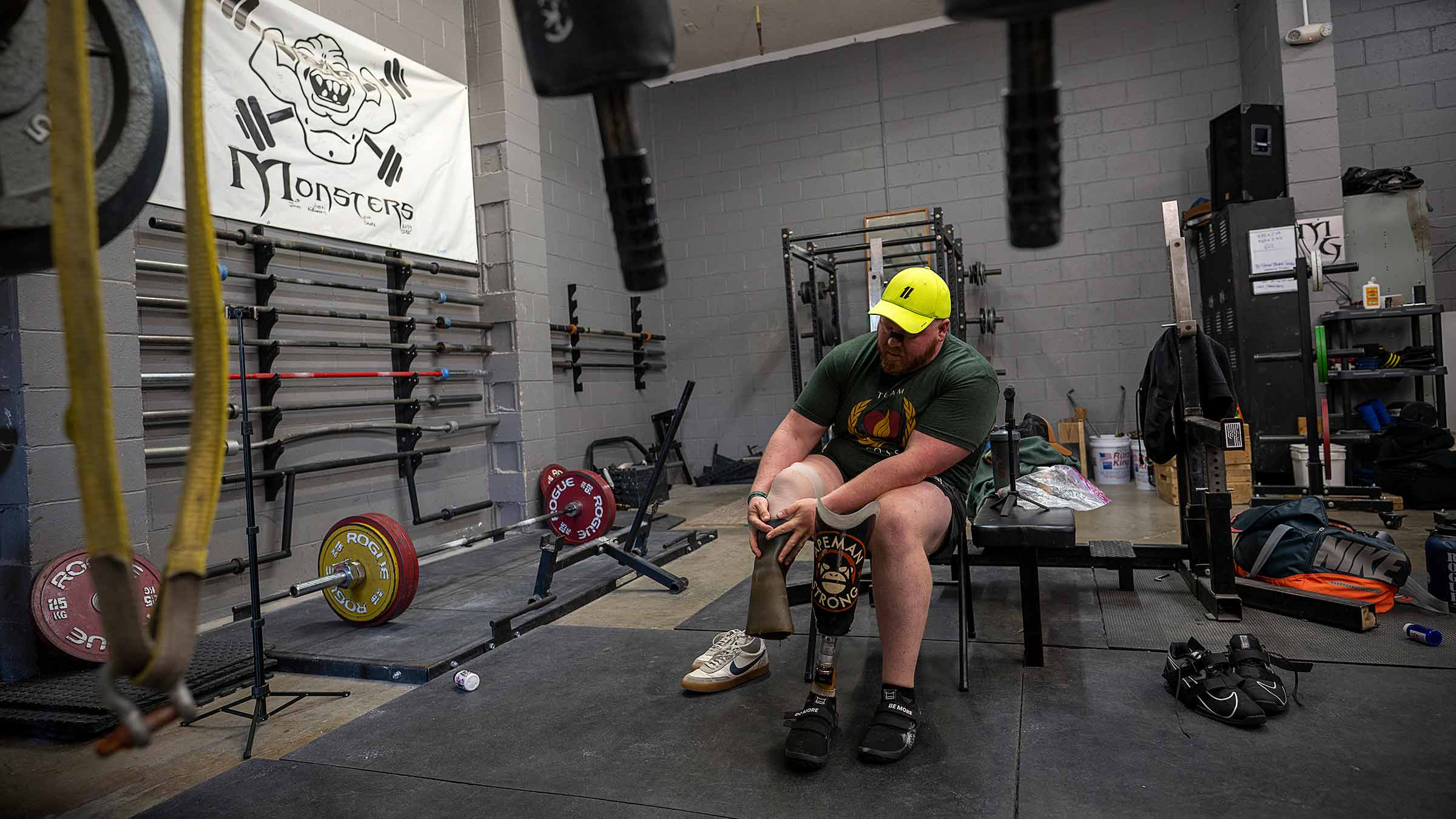
As Hill struggled to manage the lingering trauma, he found something else to fight, through a sport that pulled him up and then pushed him forward.
Powerlifting had channeled Hill to his calling as a motivational speaker and podcaster, allowing him to reach others going through similar struggles.
“It was the day that I first discovered powerlifting that put me on a better path. It’s the thing that allows me to cope with and process and deal with all the emotion,” says Hill. “To face the thought of losing that one thing that has kept me under control for all these years — there aren’t words to describe that.”
“And so, yes, it’s just a hernia. But what it can impact can mean so much more, including your life,” says Hill.
Restoring hernia surgery’s reputation
Surgeons perform about 1.6 million hernia repairs each year in the United States. Dr. Poulose, a professor of Surgery at The Ohio State University College of Medicine, says this arguably makes hernia disease one of the most common reasons for surgeries in general.
But the procedure has a reputation issue, some of it due to complications caused by meshes used during surgeries. Dr. Poulose is trying to help turn that around, spurred in part by a former patient, a materials scientist, who asked why the meshes were not tracked and monitored.
Dr. Poulose is a cofounder and currently vice president and director for quality and outcomes for the Abdominal Core Health Quality Collaborative, which helps to improve abdominal core and hernia care by providing best practices guidelines based on analysis of data and patient outcomes.
The human toll of hernia surgery and repair
Because hernia repairs are so common, the impact of this work cannot be underestimated, primarily in terms of patient wellness, says Timothy Pawlik, MD, PhD, MPH, head of surgery at The Ohio State Wexner Medical Center and chair of the Department of Surgery at the College of Medicine.
“It’s also an enormous cost on the health care system, and people who have hernias and need repairs lose a lot of work time,” Dr. Pawlik says. “So, this is an incredibly important surgical issue, and we’re incredibly lucky and blessed that we have Dr. Poulose here.”
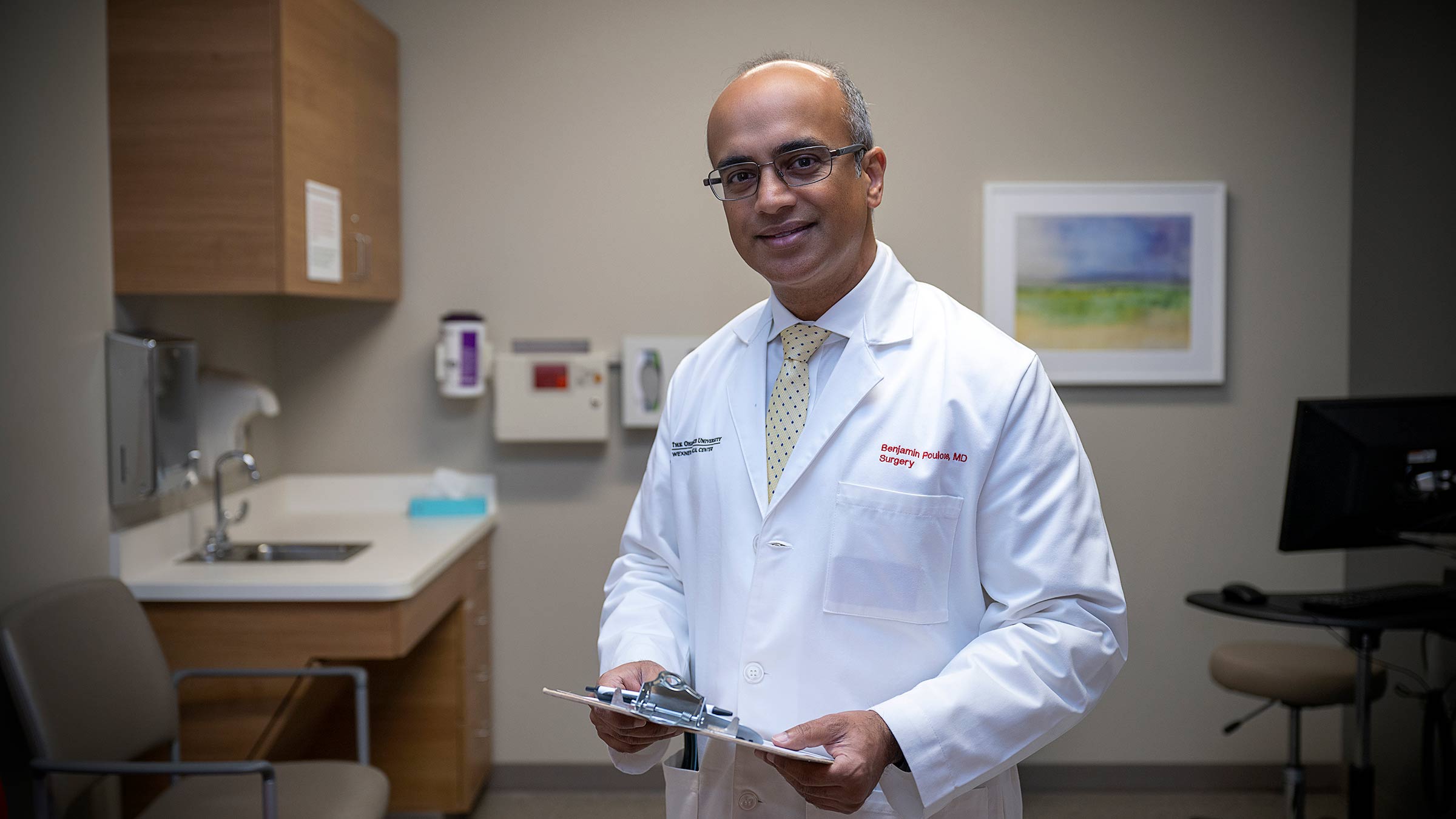
Hernias generally don’t get a lot of thought unless someone is impacted by one, says Dr. Poulose. But they can affect people in profound ways. For example, as many as 41% of cancer patients who undergo surgery, like Hill, develop hernias, which sometimes get ignored in the shadow of surviving a life-threatening disease.
“In fact, when they look in the mirror every day, they see a gigantic bulge where their abdominal core muscles used to be,” Dr. Poulose says. “It’s probably hurting them as well, on a day-to-day basis. And it’s a daily reminder of the cancer that they fought. That’s an example of some of the assumptions that ‘well, it’s just a hernia, you don’t have to worry about it.’”
A holistic approach to abdominal health
Experts from several different fields come together at the Center for Abdominal Core Health, using the latest research to treat patients with problems like hernias, separation of the abdominal muscles (diastasis recti), growths or tumors.
“It goes back to a pretty simple concept — that everything is related and interconnected in terms of making you feel good as a human being,” says Dr. Poulose.
He emphasizes that patients fare better when specialists work together, in the clinic, in the research lab and in the classroom, to understand what’s going on with the body as a whole.
“Humans aren’t designed to be thought of as separate compartments. We all know it’s all related; our approach to care should move closer to that,” Dr. Poulose says.
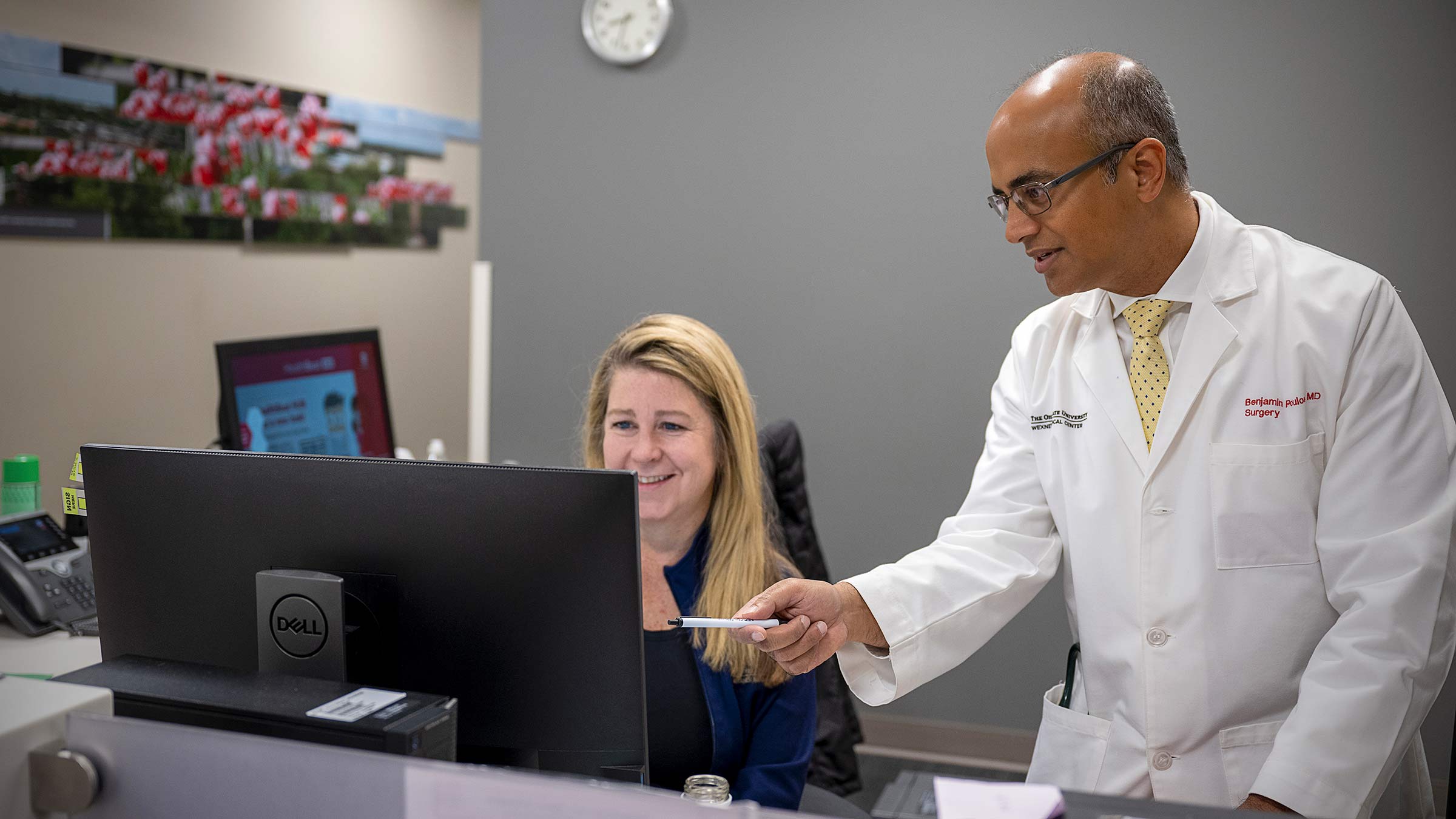
Creating a new focus on abdominal core health
Dr. Poulose brings a holistic approach to hernia care by partnering with fields like biomedical engineering, dietetics and nutrition, physical therapy and rehabilitation, sports medicine and more, Dr. Pawlik says.
“He’s established one of the premier abdominal core health programs in the country and, arguably, the world,” Dr. Pawlik says.
“This 360-degree approach has improved outcomes for patients not only with regards to recurrence rates but, perhaps as importantly, to their quality of life,” says Dr. Pawlik.
Hill says Dr. Poulose has top skills not only as a surgeon, but as someone able to calm the fears of his patients with a unique warmth.
“His positivity is very uplifting,” says the 260-pound powerlifter. “He really wants to know who you are, what you love, what makes you tick. And that’s something that’s not just rare for a surgeon. That’s rare for a human in general.”
Inspired to make an impact
Dr. Poulose grew up in Leavenworth, Kansas, outside Kansas City, the youngest of three sons of first-generation immigrants from southwest India. His parents were career physicians in the U.S. Department of Veterans Affairs, his father a neurologist and his mother a psychiatrist.
“I went to the office with my mom and dad and saw the impact they had on their patients,” he says. “I also saw the challenges and rewards that career brought. The main thing was how patients would respond to treatment from my parents and how they got better.”
He was tempted by another calling in high school when he and three friends glimpsed success as a garage band. The first time they received money for a gig, at a Knights of Columbus hall, he returned home to his parents at 2 a.m., hardly able to believe he could get paid for something so fun.
“It was one of those earth-shattering moments that defined a little bit of who you are,” Dr. Poulose recalls. “I was like, ‘Hey, Mom, I got 250 bucks just for playing the keyboard.’ And of course, they were very happy, but in a cautious way, in terms of, ‘You will not be able to make a career out of this’ and ‘How is this going to help you be a doctor?’”
His parents continued to do their part to encourage his interest in medicine. And the music, in a way, also did its part: Dr. Poulose still regularly plays keyboards and guitar, which keeps his fingers nimble for surgery.
Paying it forward
From the day of his surgery in July 2022, Hill noticed for the first time in a decade that he didn’t have the bumps and bulges he’d grown used to.
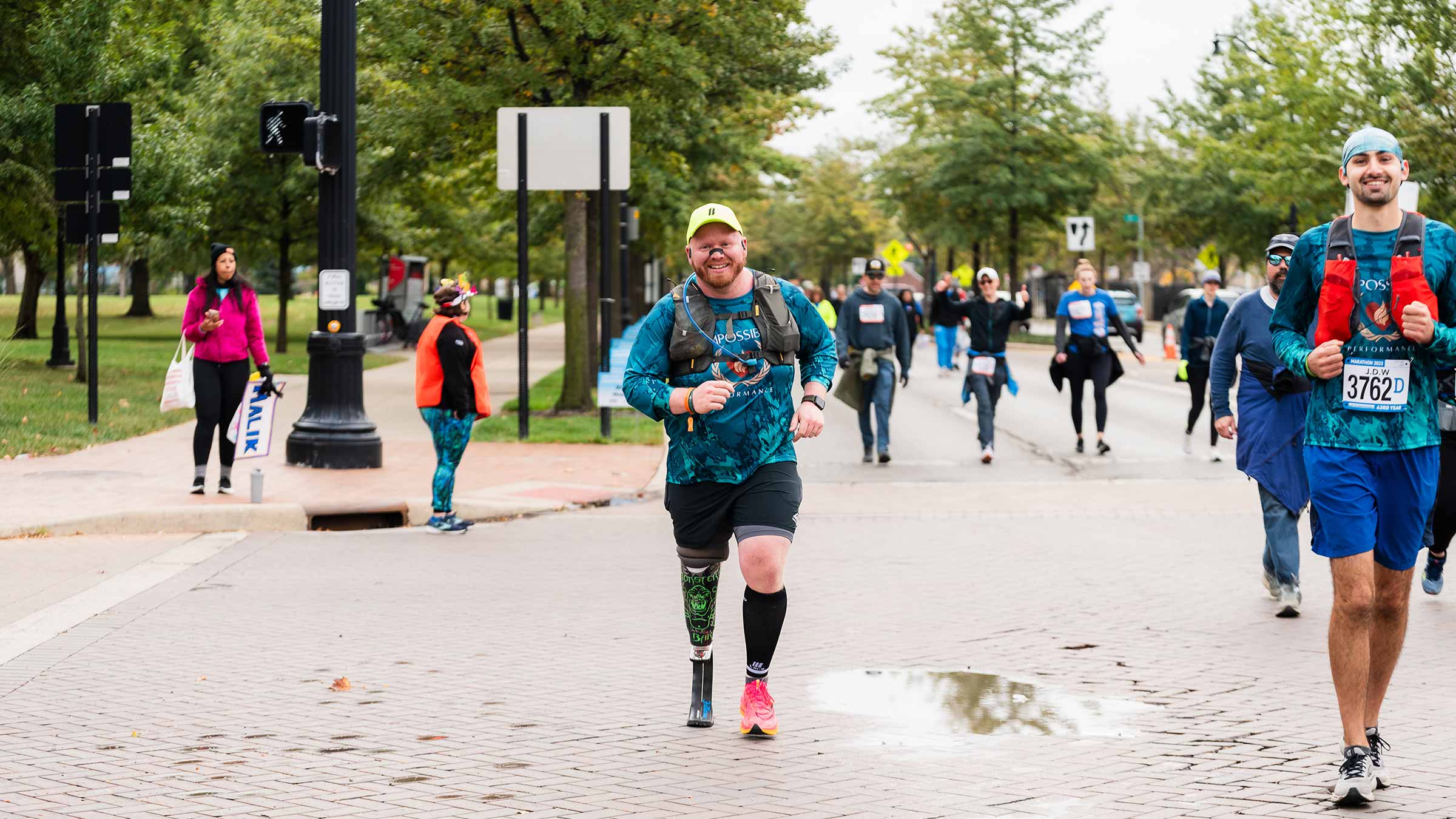
Matthew Hill ran in the Nationwide Children’s Hospital Columbus Marathon in November 2023 to raise money for childhood cancer. Running by his side during training and at the event was one of his closest friends James Wright. (Courtney Wentz Photography/Courtney Wentz)
Dr. Poulose enrolled him in a clinical trial that included eight weeks of intensive physical therapy. Hill learned things about abdominal core muscles he’d never known before.
It was life changing, he says, but his “big threshold” had not been tested. Would he be able to deadlift 300 pounds, a weight believed to be too heavy for someone who’d had a hernia surgery?
“That was my gold standard that I was basing everything on. And 16 weeks after surgery, I deadlifted 315 pounds for 12 reps,” Hill says. “I was stronger than I’d ever been. That’s when I was, like, ‘OK, we’re back. Things are good to go.’”
A year later, he ran the Nationwide Children’s Hospital Columbus Marathon to celebrate being 10 years cancer-free, raising more than $30,000 for childhood cancer research.
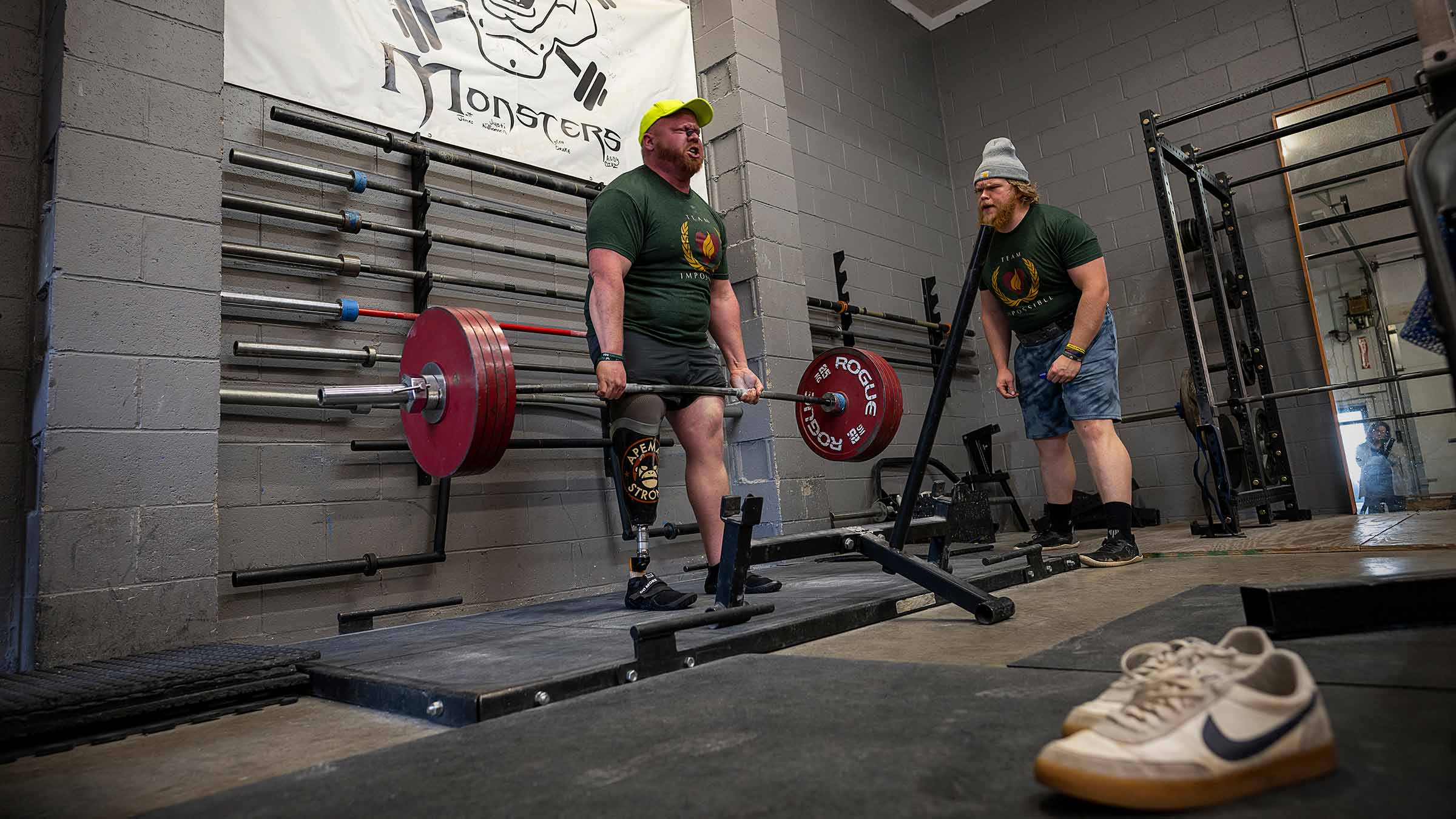
By December 2023, the surgery had given Hill the confidence to compete in a powerlifting competition, where he attempted a 550-pound deadlift, more than he'd ever lifted.
He performed two reps without a hint of pain — and took home first place.
He credits Dr. Poulose and his team with helping him get to where he is today.
“They’re changing lives every single day. And they’re changing the lives of people like me, who can go out and change the lives of others,” Hill says. “And I think that’s a really powerful place to be.”

Leaders in core health
The Center for Abdominal Core Health offers a team of experts and innovative care for both simple and complex issues.
Get started


